Wayne C. Allen's Blog, page 36
July 6, 2015
You’re Not Too Busy
Synopsis: Busy-ness is actually an excuse for not dealing with, or even setting, your priorities.
I was just doing a bit of scanning of my Facebook page, and came across a link to an article on “Meditation for busy people.” When I see stuff like that, I tend to move rapidly past. But something caused me to roll back up to it.
Turns out that the link is to the OSHO site, and OSHO was one of my favourite guru-like guys. Here’s the quote they used:
Osho Meditation for Busy People — Step 1:
Daily Watching:
“Start being aware with day-to-day, routine actions, and while you are doing your routine actions, remain relaxed.
There is no need to be tense. When you are washing your floor, what is the need to be tense? Or when you are cooking the food, what is the need to be tense? There is not a single time in life that requires your tension. It is just your unawareness and your impatience.“
Osho
I’m going to come back to this quote, but first, let’s talk about being busy.

The Bored Board
Thing is, no one is Busy, busy.
By this I mean, no one is so busy that they do nothing. When we say, “I’m too busy,” we mean, “I’m too busy for that.”
I hope you can see, then, that the issue is not busy-ness, but rather one’s priorities.
In my book, The. Best. Relationship. Ever. I wrote about a client I had, who I called Peter Pan.
Short version, at the time of the story, he was almost 60, was married to one of my clients, had a Ph.D., was a prof, and despite being married, was spending his every free moment searching the world for his soul mate. He just knew she was out there.
Here’s a quote from the story:
“I know for a fact that my wife is not my soul mate. She’s a nice person to live with while I wait to meet my soul mate. I have been in many, many relationships, but none have worked out, because I never found my soul mate. Even though I am now married, I am still looking for her.” (Hint to Peter Pan: You can’t find her; she lives in Never-Never Land!)
Scratching my head, I asked, “How will you know your soul mate when you meet her; how will the relationship differ from your many previous relationships?”
He replied, “She will be beautiful and completely focussed on making me happy. There will never be any conflict, disagreement, or problems. We will live a life of complete personal, relational, and sexual bliss.”
I was glad I was not drinking coffee, or it would have shot out of my nose.
The. Best. Relationship. Ever. p. 7
Now, if you have a look at what he wanted, versus what he had, you might be able to discern this: he thought that, when he found the right person, there would be no work involved. Relating would “just happen.”
In other words, he was too busy to work on relating, and large ego leading, figures he’s too special to have to.
Not that he ever put it this way, but really, his career, his studies, his research, and his world-travelling (seeking the Wendy to his Peter Pan) are his priorities.
And here’s the kicker! Since he’s clearly too busy to work on relating, as a solution, he, a Ph.D. proposes magic.
This is typical scenario for broken relationships. Lots of lip service to “working things through,” but no actual work. No therapy. No “30 minutes a day of uninterrupted conversation” (an exercise in my book, This Endless Moment.) Because, of course, “I / we am / are too busy to spend 30 minutes a day talking.”
This is not about busy-ness. Relating is simply not a priority.
Back to the OSHO quote.
You could assume, by the title, that OSHO was actually saying that people are busy, and therefore, here are some shortcuts. But the quote above recommends:
“Start being aware with day-to-day, routine actions, and while you are doing your routine actions, remain relaxed.”
Does that sound like 3 minutes a day to bliss? Or, rather, does it not sound like, “Hey! Idiot! Pay attention!”
Do something (irony alert!) simple. Pay attention to ALL OF your routine actions, AND THEN, remain relaxed.
This is a prescription for changing everything.
In order to do so, though, you’d have to make it a priority. It would have to to take precedence over, say, sitting around in the evening, drinking Scotch and “unwinding.” It would have to take precedence over watching TV instead of talking.
Back when we had a home 
June 29, 2015
Finding a Place of Acceptance
Synopsis: It’s important to pay attention to the things we stress ourselves over, and then to let go, finding a place of acceptance.
 Nothing like crowded beaches…
Nothing like crowded beaches… 
June 22, 2015
Don’t Know — Show
Synopsis: You can’t think your way to a more elegant life. Elegance is in the doing! Don’t Know — Show!
Not that it’s important, but the online version of this blog runs on Word Press (WP), probably the most popular blog platform out there. WP got updated a few weeks back, and one of my WP plug-ins started acting up a bit. As the plug in lets me easily add links to Amazon books, I decided to replace it.
To do so, I’m having to change the coding on blog posts that used the old plug-in. Which means, going through each of nearly 400 posts.
Good thing I like re-reading my writing. 
June 15, 2015
Front, Back — Yin, Yang
Synopsis: We have within us a range of abilities, views, and attributes. Today we have a look at how they might better play with each other. Front, Back — Yin, Yang
In This Moment
Last time…

You likely know that I have a separate site for my books–The Phoenix Centre Press. I mention this because Darbella and I have been editing a work of fiction from a new author, W. Asher Charles.
The Kindle Version is available here, and
the Amazon paperback is here.
I’ve linked to Amazon.com; if you shop at other Amazon locations, just search for W Asher Charles.
The book is called Walking Through, and it’s a sci fi adventure complete with a Zen flavour, ninjas, sex, and the multiverse.
(Please note! Adult content!)
If you’d like to read a sample (Amazon limits us to releasing 10% of the book as a preview, and it’s just over 110,000 words) we’ve set up a pdf of the first few chapters. You don’t even have to jump through hoops, just right click here, and then save the file to your computer. Then, if you like it, keep your eye out for a release e-mail.
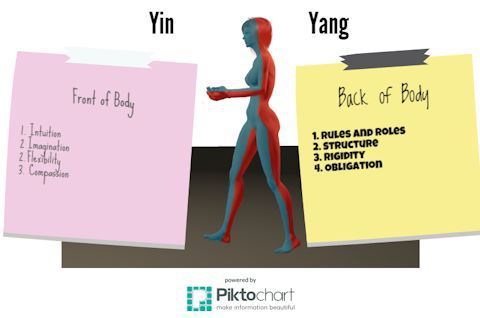
front back yin yang
I’ll get to the above chart as we go along. But first I want to tell you a story.
A friend of ours has had, for 15 years or so now, a famously wonky back. For which there is no medical reason, something that gains importance as we go along.
Anyway, a few weeks back she messed her back up again; as usual, doing “nothing.” She ended up off work for several days. The Saturday came around and they invited us for dinner, with the warning that she wasn’t sure she’d make it through the meal without needing to lay down.
And she didn’t. Almost, though.
They have a massage table, which, considering her back, gets a lot of use, so I suggested she lay on it, and the 4 of us could still talk. And I could work on her back. So, she did. And she let me know that, this time, she was sure she’d done some major damage.
I checked, and didn’t feel any lumps or bulges, and said that I was pretty sure that, as usual, nothing physical was going on.
One more thing about her, and then, a bit about the chart.
She was lying face down, and noted that the front of her body felt much better than the back of her body.
You’d be tempted to whip out a “Well, duh, it’s her back that’s out” kind of response to that, but bear with me. I had a flash that there was something about yin vs. yang energy that I’d been missing, but that’s how my mind works.
Anyway, all the way home I “mulled.” Late that night, back home, couldn’t sleep.
I fell into one of those dreaming without dreaming states, and imagined myself writing a book about what she said. And the red and blue person (see above) played a prominent role.
The internal exploration I was doing had everything to do with yin and yang.
Now, if you’ve been reading my stuff for any length of time, you’ll know I’ve written about this topic before. The software behind this blog likely will even list some of those other articles below, assuming you’re reading on the website. But here’s the weird piece… I’d never really thought about yin and yang as it acts as a metaphor for the front / back of the body.
So, I had an “of course” moment.

In Chinese thought, things seek balance. This is so with the meridians, with the energy pools (Dan Tian,) and for the Taoists, with Yin and Yang. The symbol shows this by the equal amounts of (normally) black and white. But more importantly, balance is shown symbolically by the black circle in the white side, the white circle in the black side.
This is the closest an unlabelled illustration can come to making the point that neither polarity is “better” — “better” is both/and, not either/or.
You might say that “The West” is yang, and “the East” yin—specifically because the West loves “either/or,” the East “both/and.”
By this, I mean that in the West, the expectation is that someone or something is always going to figure out specifically what is up, and what is up is going to be clear-cut and obvious, once the expert declares “truth.”
In the East, it’s not so clear.
 Of course you have a headache! You have flags stuck in your skull.
Of course you have a headache! You have flags stuck in your skull.For as long as I’ve known her, my friend has been searching for a medical reason for her wonky back. Only, here’s the issue with that. Her back is perfect. OK, maybe not perfect, but not the cause of her pain.
X-Rays? Negative. Physio? Nada, or rather, “It’s coming from your pelvis.”
So, what’s another story about her pain? Things tend to go off the rails for her when she’s stymied. When her emotions get triggered.
And I’ve got a million examples of that happening—emotions leading to non-physically caused pain. I’ve seen it with friends, past clients, myself, Darbella. And that’s where the above drawing comes in handy.
Or so my non-dreaming dream suggested. Have another glance.
As an overall metaphor, (and that’s what yin / yang is… a metaphor) try this: the yang (back) side of the body is tasked with control. Because control has to do with rules and roles, the yang side fears flexibility.
Yang 101 — Beliefs
Without control, we “wouldn’t have a leg to stand on.”
The yang side warns us to “watch our butt,” so no one “stabs us in the back.”
Helps us to “stomach” things, without getting a “belly full.”
Forces us into military posture, so we can “(wo)man up.”
Gives us the “spine” we need to survive.
Helps us to “shoulder our burdens.”
Keeps us from “sticking our neck out.” And emphatically, the Yang side
values “the right answer” (party, religion, sex, philosophy, etc.)
You remain “in the right” by standing up for yourself, and you do that by speaking your mind.
That last one is my favourite. Imagine what the world would be like if we “spoke our hearts.” But I digress.
I almost thought I should write a book about all of this. But anyway…
So, imagine a person, caught in rules and roles. They’d want to be a good son / daughter, father / mother, wife / husband. As if anyone has a clue what that means.

Take “good wife.” Can you see that how “good” is defined has everything to do with where you were born, what your religious affiliation is, even your politics? And haven’t you heard multitudes going off on this one, absolutely convinced that their view of how a “good wife” behaves was the correct one?
That’s Yang.
But please, don’t get your back up… 
June 8, 2015
Change Isn’t Possible, but Choice Always Is
Synopsis: people are always trying to change things… usually other people… and annoy themselves when the “same old thing” occurs. They miss the point: Change Isn’t Possible, but Choice Always Is
NOW Available!

You likely know that I have a separate site for my books–The Phoenix Centre Press. I mention this because Darbella and I have been editing a work of fiction from a new author, W. Asher Charles.
The Kindle Version is available here, and
the Amazon paperback is here.
I’ve linked to Amazon.com; if you shop at other Amazon locations, just search for W Asher Charles.
The book is called Walking Through, and it’s a sci fi adventure complete with a Zen flavour, ninjas, sex, and the multiverse.
(Please note! Adult content!)
From the back cover:
Roberta Thatcher is fresh out of grad school, dating her roommate’s father, and starting a new job at a company known for its secrecy and weirdness.
And that’s the good news.
Roberta soon finds herself fighting for her life, trying to decipher the mysterious Newman Corporation, and to keep her hands off her hunky boss.
Then her younger sister cracks up, her much older ex becomes a threat, Ninjas start popping up everywhere, and Roberta is confronted with the reality of the dangerous Multiverse.
And the world goes on, oblivious to the dangers — wars, uprisings, provocateurs in our midst. Clueless right-wing politicians dither and distract with “anything goes” legislation, and the troubles only grow.
It’s up to Newman & Co. & Roberta to join the fray. To turn back the curse of the Red.
Sci fi. Sex. Ninjas. The Multiverse.
What more could you ask for?
If you’d like to read a sample (Amazon limits us to releasing 10% of the book as a preview, and it’s just over 110,000 words) we’ve set up a pdf of the first few chapters. You don’t even have to jump through hoops, just right click here, and then save the file to your computer. Then, if you like it, keep your eye out for a release e-mail.
 Change Isn’t Possible, but Choice Always Is
Change Isn’t Possible, but Choice Always Is Last week’s article on self-sabotage came with a promise of this article… a bit of a look at the problems connected with the idea of change.
The title is actually a quote I first heard at The Haven in 1998, while attending Phase 3. I’m pretty sure Ben Wong said it, although there’s a small chance it came from Jock McKeen. Sounds like Ben to me, though.
Let’s see how the quote unpacks.
Later, I’m going to emphasize the word “always,” but let’s start at the beginning. Whenever I hear the word, “change,” my head flashes back to an episode of All in the Family. Archie is trying to be sympathetic, a difficult task for him. Edith has just entered menopause, and is not a happy camper. She’s having hot flashes, and her temper flares, and then she’s crying.
Finally, and this is Archie, he’s had enough. “Edit’. If you’re going to have a change of life, you gotta do it right now! I’m going to give you just 30 secods. Now, come on. Change!”
She smiles an Edith smile, and says, “OK, Archie!” Then, she heads off to get a phone number, leaving Archie smirking. He makes a comment about how he should have made his demand sooner and saved himself some trouble. He then asks Edith if she found the phone number.
Edith screams a bunch of stuff, ending with “Get your own number!” Archie, bemused, says, “Well, back to the groin-o-cologist.”
Most of us would dearly love to be able to change others, and even occasionally change ourselves. Mostly others, though, and that’s what a lot of our gripe sessions feature: “If only others would see the light and ‘just behave,’ my life would be great!”
Because, of course, blaming others for messing up our lives is pretty simple. And phew! Off the hook again.
It’s ironic, how easly we think all of this ought to work — state a “change-point,” and have it happen. “Edit’! Change!”
Except when it comes to ourselves, and then we’re quick to point out that “change is hard.”
And we’re almost right. Change isn’t hard. It’s impossible.
What is possible, our quote tells us, is choice.
 25 — when it all began
25 — when it all beganLast week I made mention of my free Watcher booklet, and mentioned my affinity for depression. My first go-around with this was in my 20s, and I quickly started therapy, and continued with it for decades. I began it for a silly reason — to come up with a way to change from ‘depressed guy’ to ‘chirpy guy.’
I quickly discovered that “Change isn’t possible.” The whole situation got worse before it got better. Suicidal ideation became my middle name.
Then, I created The Watcher. This was a shifted perspective in my head that I could implement, using it to stabilize myself. The key was, I had to break myself out of my doom and gloom stories, and walk another path. I had to make another choice.
My last go round with this was in May of this year. I woke up in a blisteringly bad mood, and proceeded to make it worse. Darbella’s good with me, and quick to remind me to pay attention to what I’m doing. After a couple of hours of digging a ditch for myself, I pulled myself out, using Watcher techniques.
Change isn’t possible, remember? But choice is.
This is so for all of us. If something isn’t working, we have to choose something else. If we are not communicating, we have to communicate. If we are blocking our emotions, we have to emote.
But here’s the bugger in all of this.
We have to choose always.
A week ago, Ben’s quote again popped into my head, and I heard it with new ears, and realized what Ben had said. Before I re-heard the quote, I had missed the “always.”
There are 2 ways to define the “always” in our sentence:
You could, of course, take it to mean “any time,” as in “…but you can make another choice any time.” That’s how I had thought of it.
Another choice 
June 1, 2015
The Joys of Self Sabotage
Synopsis: today we take a walk through the joys of self sabotage — our propensity to get in our own way — and discover a few things we can do to stop ourselves
NOW Available!

You likely know that I have a separate site for my books–The Phoenix Centre Press. I mention this because Darbella and I have been editing a work of fiction from a new author, W. Asher Charles.
The Kindle Version is available here, and
the Amazon paperback is here.
I’ve linked to Amazon.com; if you shop at other Amazon locations, just search for W Asher Charles.
The book is called Walking Through, and it’s a sci fi adventure complete with a Zen flavour, ninjas, sex, and the multiverse.
(Please note! Adult content!)
From the back cover:
Roberta Thatcher is fresh out of grad school, dating her roommate’s father, and starting a new job at a company known for its secrecy and weirdness.
And that’s the good news.
Roberta soon finds herself fighting for her life, trying to decipher the mysterious Newman Corporation, and to keep her hands off her hunky boss.
Then her younger sister cracks up, her much older ex becomes a threat, Ninjas start popping up everywhere, and Roberta is confronted with the reality of the dangerous Multiverse.
And the world goes on, oblivious to the dangers — wars, uprisings, provocateurs in our midst. Clueless right-wing politicians dither and distract with “anything goes” legislation, and the troubles only grow.
It’s up to Newman & Co. & Roberta to join the fray. To turn back the curse of the Red.
Sci fi. Sex. Ninjas. The Multiverse.
What more could you ask for?
If you’d like to read a sample (Amazon limits us to releasing 10% of the book as a preview, and it’s just over 110,000 words) we’ve set up a pdf of the first few chapters. You don’t even have to jump through hoops, just right click here, and then save the file to your computer. Then, if you like it, keep your eye out for a release e-mail.
 All sabotage is self-sabotage
All sabotage is self-sabotageAfter I wrote the first article in my return to blog-writing, our friend Henry Staron sent the following, via Facebook (follow me on Facebook, and/or Twitter).
I have a topic — self sabatage. Why is it as soon as I get close to a desired goal or get a first taste of success something happens to pop me back to square one? I do not think I am the only one who seems to repeat this process, so I would like your thoughts on “breaking through” these roadblocks I construct…
god, I love questions! And the rest of you reading this, do understand that your questions almost always become my articles! Ask away!
Anyway, there’s something interesting going on in this question — namely, that how we block ourselves and how we resolve the blockage are both expressed. Read Henry’s question again, and see if you see it.
Go ahead, I’ll wait.
OK. let’s start with the last clause of sentence 2: “…something happens to pop me back to square one.”
From a Zen perspective (my favourite approach,) nothing is ever happening to us… there is no “something.” By this I mean that the things we confront have no intrinsic meaning.
So, sure, “things” may arise — obstacles, threats, dilemmas, even outright ‘sabotage.’ But none, intrinsically, has the power to stop us. We provide the interpretation, and that creates the “brakes.”
Here’s a little Zen story about that:
During the civil wars in feudal Japan, an invading army would quickly sweep into a town and take control. In one particular village, everyone fled just before the army arrived — everyone except the Zen master. Curious about this old fellow, the general went to the temple to see for himself what kind of man this master was. When he wasn’t treated with the deference and submissiveness to which he was accustomed, the general burst into anger.
“You fool,” he shouted as he reached for his sword, “don’t you realize you are standing before a man who could run you through without blinking an eye!” But despite the threat, the master seemed unmoved.
“And do you realize,” the master replied calmly, “that you are standing before a man who can be run through without blinking an eye?”
Now, we all tend to have a “yeah, right” reaction to stories like these, because, like the villagers, we have spent our lives kowtowing to the “blustering general.” We confront an obstacle, and rather than see it for what it is, we generate fear and loathing.
In the third paragraph, Henry writes, “…so I would like your thoughts on “breaking through” these roadblocks I construct…”
And there is the truth of the matter.
Our dilemmas, all of them, are self-created, which is why it’s called self sabotage.
So, a few things to do when confronting self-sabotage:
 Get me off of this roller coaster!!
Get me off of this roller coaster!!1. Stop. One therapist/supervisor I had told me to literally say “Stop!,” preferably out loud. I still do, although mostly now I just say it internally. The purpose of the “Stop!” message is to use it to exit the emotional drama we have spun up — the “this is awful, this is the worst, woe is me” stuff.
When we are in the midst of drama making, it can be difficult to see what we are doing to ourselves… “it… it… all seems so real!” So, we get caught, right up until we choose to unstick ourselves. And then, it’s hard to remember why we got caught in the first place. This is the reason for yelling Stop!
 As any fool can plainly see…
As any fool can plainly see…2. Look. Internally and externally, we want to look dispassionately at what we are doing to ourselves. Once we’ve exited the panicky feeling, we can more clearly examine what we are creating for ourselves. This is done by taking a step back, having a breath or several, and evaluating without drama.
Now, sometimes — rarely, actually — the ‘threat,’ like the general in the Zen story, is real, and is standing right there, waving a sword. Even so, “woe-is-me-ing” is non-helpful, and why we “stopped” ourselves in step 1. A real threat needs a direct response.
The rest of our obstacles, 95% of them, are illusions tossed up by our egos to keep us from doing things differently. In other words, our looking shows us that nothing is really happening. Or better, nothing bad is happening.
You likely know the story of Thomas Edison, and how he tried over 1000 things as a filament for the light bulb, before discovering what worked. When a reporter asked, “How did it feel to fail 1,000 times?” Edison replied, “I didn’t fail 1,000 times. The light bulb was an invention with 1,000 steps.”
Yeah, sure.
No, really. How very Zen. The idea of the work taking a 1000 steps was the mind-perspective Edison used to keep going, as opposed to the self-sabotage of declaring himself a failure.
I would like to imagine that his process was to experiment, note his results, then wash, rinse, repeat. This worked for him because his eyes were set, dispassionately, on the goal of ‘create viable electric light bulb,’ rather than on his endlessly changing feelings.
The process of looking allows us to see how we get in our own way. We see our pattern(s) of self-sabotage, which are of course unique to us, and ubiquitous to humanity. We all do it, and we all do it our own way.
That we self-sabotage doesn’t mean anything. Unless we refuse to see.
 I am speaking up!
I am speaking up!3. Listen. As we quiet ourselves and “just look,” at the same time a small voice will become audible, and it will say, “Wow, here I go again. I sure do like creating drama for myself.” I call this voice The Watcher, and even wrote a booklet about how to nourish this voice. (Downloadable for free from here.)
I began that booklet by mentioning one aspect of my own nature, which leans toward melancholy, and has touched ‘suicidal’ a few times in my life. My next article is going to be about choice and change, so stay tuned, but let me say at this juncture that none of the self-work I have done has changed my nature one iota. I still get melancholy / depressed.
However, what I learned to do is to listen to myself when I’m making myself melancholy. I hear myself “awfulizing” the situation, and positing dire solutions. I treat the part of me that does this with compassion, while also letting my Watcher steer my actions toward healing and resolution.
So, I acknowledge without judgement my tendency to sabotage myself, I respond with compassion, and then I urge myself to take one step away from the edge of the cliff. For more on doing this, see this article.
 The floating foot of fate…
The floating foot of fate…4. Cross the tracks. The discipline of stopping, acknowledging, listening to, being compassionate toward, and then acting in the direction of the original goal is something we must endlessly repeat. We are using this approach to stop what doesn’t work (getting in our own way) and substituting what does (the first step on another approach to the destination.)
Again, this is a ‘wash, rinse, repeat’ thing. We need to apply this pattern each time we screw with ourselves, because of course we will. Moments of enlightenment are always followed by “life,” by chop wood, carry water — life goes on, and things, (and our dramatic reactions) re-occur.
Once we see that this “is as it is,” we can choose to stop berating ourselves for not “getting it,” and just “get it” this time.
Besides, life is like school. We learned to add, and mastered it. That mastery, however, did not lead to stasis, but to multiplication, algebra, calculus, etc. In a similar way, we learn to be self-compassionate, then bump our noses against the next obstacle. Rather than keep the drama going, we can halt our headlong rush into misery. Thus, the wise soul sees each bump as an opportunity to learn something new.
It’s embracing the “predictable unpredictability” that is the nature of living, without fearing the usually imaginary sword that seems poised to run us through.
What it is is what it is, and then we make a choice, and something else is.
Stop. Look. Listen. Cross the tracks. 1000 times. Did the light bulb go on?
The post The Joys of Self Sabotage appeared first on The Pathless Path.
May 25, 2015
Jump Tall Buildings, Chase Cowboys
Jump Tall Buildings, Chase Cowboys — You Gotta Go With What You Got
In This Moment
Just to repeat last week’s news!

You likely know that I have a separate site for my books–The Phoenix Centre Press. I mention this because Darbella and I have been editing a work of fiction from a new author, W. Asher Charles.
The Kindle Version is available for pre order here. I’ve linked to Amazon.com; if you shop at other Amazon locations, just search for W Asher Charles.
The book is quite fun, and we’re glad to have helped out, getting it ready for a June 1, 2015 release date.
The book is called Walking Through, and it’s a sci fi adventure complete with a Zen flavour, ninjas, sex, and the multiverse. (Please note! Adult content!)
From the back cover:
Roberta Thatcher is fresh out of grad school, dating her roommate’s father, and starting a new job at a company known for its secrecy and weirdness.
And that’s the good news.
Roberta soon finds herself fighting for her life, trying to decipher the mysterious Newman Corporation, and to keep her hands off her hunky boss.
Then her younger sister cracks up, her much older ex becomes a threat, Ninjas start popping up everywhere, and Roberta is confronted with the reality of the dangerous Multiverse.
And the world goes on, oblivious to the dangers — wars, uprisings, provocateurs in our midst. Clueless right-wing politicians dither and distract with “anything goes” legislation, and the troubles only grow.
It’s up to Newman & Co. & Roberta to join the fray. To turn back the curse of the Red.
Sci fi. Sex. Ninjas. The Multiverse.
What more could you ask for?
We’ll be releasing it on Amazon by the end of the month. The paperback might be out just ahead of the release date.
If you’d like to read a sample (Amazon limits us to releasing 10% of the book as a preview, and it’s just over 110,000 words) we’ve set up a pdf of the first few chapters. You don’t even have to jump through hoops, just right click here, and then save the file to your computer. Then, if you like it, keep your eye out for a release e-mail.

Ride a Cowboy???
Darbella and I were having a leisurely soak at The Radium Hot Springs, and ambled over to the hot tub to raise the temp a couple. Not long after, a woman about our age joined us, and a great conversation ensued.
We asked her where she was from, and we eventually learned she was from Alberta, had spent years on cruise ships, and now was (like us) homeless.
We had to know how she was playing that one out, when she grinned a toothless grin, and said, simply,
“What do I need a home for? I have a camper van and a Master Card!”
We kept on gabbing, and she said, “I gotta stop talking, my mouth hurts.” She then went on to explain that she’d just had all of her teeth pulled, something I’d have to admit we’d immediately noticed. Seems that her dentist had discovered a class A infection.
She then announced that she was a week or so away from having her knee “done,” as in replaced, and they pulled her teeth a couple of weeks before, because… infection.
OK, so you’d think that that was a lot to deal with, right? No teeth, just gums, mouth pain, having to keep an eye out for infection, and on top of all of that, knee replacement looming, including the attendant hospitalization for healing and physiotherapy. (Thank Buddha she lives in Canada, eh?)
Anyway, if I was expecting a sob story (my mom had both knees done, and I know how weird it all is, and mom certainly let us know just how bad she thought it all would be…) I was not to get one.
She wrapped up the medical info with, and I’m paraphrasing, but only slightly,
“Shiny new teeth, great new knee! I’ll be leaping tall buildings and chasing cowboys… and now I’ll be able to catch them!”
How Zen.
The trick here is to leave off the spin, which might just be a way one could define Zen. By spin, I mean the interpretation one puts on what is right in front of us. The three types of spin are:
Positive — Pollyanna meets a flock of cartoon bluebirds
Neutral — It is as it is — Zen, the Tao
Negative — Archie Bunker at his finest
You’d think a positive attitude would be a good thing, so to speak, but consider: putting a positive spin on a situation often leads to acceptance of things, behaviours, etc. one would be better walking away from. This is different from having a positive attitude, which is a self-directed activity, as in “I fully expect to have an uneventful recovery.”
A negative attitude is just… tiresome. Assuming the worst of situations and others, typically in the guise of self-preservation, simply leads to dealing with life while miserable.
It is as it is, on the third hand, is actually so. No matter how hard you argue for another spin, what you see in front of has no “essential essence.”
This is why, when two people confront the same situation (say, our new friend, and my mom) and find two different views and approaches. One is not right, and one wrong. The only question is utility: “Is this approach helping or hindering me?”
I hear a lot of “Getting older is not for sissies,” and to some extent, at 64, I’m beginning to understand how that plays out. But it’s clear that the sissy part has a lot to do with how the experiences of the latter years are different from that of the younger years.
Well, duh.
The Zen is this: things and experiences are as they are, and we are as we are. Sure, we can diet and exercise, and work our brains hard, but at the end of the day, how life actually is, is occasionally toothless and with a wonky knee. It’s not meaningless that the three things that set The Buddha on his quest for enlightenment were sickness, old age, and death. There three markers invite us to explore more deeply, past the fear and suffering.
In other words, the issue is: “This is my life right now — what am I going to do with it?”
And remember, life is then something else. We make great strides when we work from where we are, with acceptance and a sense of humour. From this place, grace and laughter have a better chance of thriving.
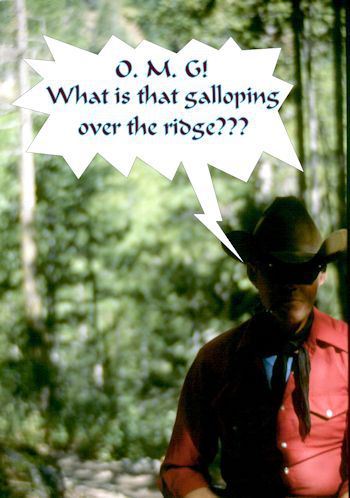
I suspect that our presently toothless friend’s attitude is going to lead to a full and fast recovery.
And a boatload of Alberta cowboys had better keep an eye out.
The post Jump Tall Buildings, Chase Cowboys appeared first on The Pathless Path.
May 19, 2015
What’s the Right Thing to Say?
What’s the Right Thing to Say? A Question that misses the point.
In This Moment
Hi there!
I’d be willing to bet that you might just have assumed we fell of the edge of the world. But no… still here, still travelling. we’re on a trip out west to BC, and soon return to Costa Rica.
I’m not committing to weekly articles, but I do have a couple of them that have been burning a hole in my head.
But first, some news!

You likely know that I have a separate site for my books–The Phoenix Centre Press. I mention this because Darbella and I have been editing a work of fiction from a new author, W. Asher Charles.
The book is quite fun, and we’re glad to have helped out, getting it ready for a June 1, 2015 release date.
The book is called Walking Through, and it’s a sci fi adventure complete with a Zen flavour, ninjas, sex, and the multiverse. (Please note! Adult content!)
From the back cover:
Roberta Thatcher is fresh out of grad school, dating her roommate’s father, and starting a new job at a company known for its secrecy and weirdness.
And that’s the good news.
Roberta soon finds herself fighting for her life, trying to decipher the mysterious Newman Corporation, and to keep her hands off her hunky boss.
Then her younger sister cracks up, her much older ex becomes a threat, Ninjas start popping up everywhere, and Roberta is confronted with the reality of the dangerous Multiverse.
And the world goes on, oblivious to the dangers — wars, uprisings, provocateurs in our midst. Clueless right-wing politicians dither and distract with “anything goes” legislation, and the troubles only grow.
It’s up to Newman & Co. & Roberta to join the fray. To turn back the curse of the Red.
Sci fi. Sex. Ninjas. The Multiverse.
What more could you ask for?
We’ll be releasing it on Amazon by the end of the month. The Kindle version will be available for pre order, and the paperback might be out just ahead of the release date.
If you’d like to read a sample (Amazon limits us to releasing 10% of the book as a preview, and it’s just over 110,000 words) we’ve set up a pdf of the first few chapters. You don’t even have to jump through hoops, just right click here, and then save the file to your computer. Then, if you like it, keep your eye out for a release e-mail.

An honest discussion, a heartfelt sense of “being with.”
So, last year we spent 3 months in a condo in Costa Rica. The condo featured a 5 minute walk to the beach, nice pool, nice other guests.
One guy in particular turned into a friend, and when he wasn’t messing around on his computer (something I never do, wink, wink) we’d yack about life. He’s a year or so younger than me, and also retired, with family back in the States.
Well anyway, Darbella and I got back from somewhere, and he was just leaving the rancho… an outside eating area… and said, “I know you’re retired, but I think I may need to talk to you…”
A bit later he returned, and gave me the back story.
Seems he had a brother and sister-in-law, and both had had a cancer scare the year before. Both had come through chemo with a clear bill of health. The brother had called my friend the night before to say that his wife had a newly discovered growth, and they’d know this evening if her cancer had returned.
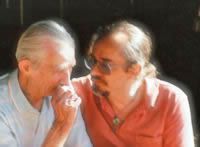
Just ask a question!
My friend was both sad and worried, and asked, “How do I know the right thing to say?”
Interesting question, yet never the point.
Once upon a time, back in my days as a minister, I got called home… a couple in the congregation had just lost their 8 month old to SIDS.
I got to their house a few hours later, to turmoil. Family hovered, but congregated nowhere near the grieving parents. Then, one would walk quickly by, and toss out a “It was God’s will,” or “He’s in a better place.”
I chased them all away, stood in the middle of the room, said, “I have no idea why this happened and have no pat answers. I’m hurting for you two, and I’m just going to stand here and hold you, if you’d like.”
They were off the couch like two shots, and they cried on my shoulders for 20 minutes. Then, and only then, we could sit down and start to sort out the details for the funeral.
I told that story to my friend in Costa Rica.
I followed up with, “You don’t know anything for sure, so call your brother and tell him you’re sad, and worried (which is what he told me he was) and will of course come right home if the report is bad. Then, ask your brother what he needs, and let him know you’re there for him.”
Because, you see, there is no “right thing to say.” When people ask for that kind of pat, “right” line(s), what they really want is to put something between themselves, their emotions, and the other person. A hedge against dealing with the reality and the pain.
I’ve dealt with thousands of clients, and not a few parishioners, and I never had a clue what any of them “needed to hear,” otherwise known as the right thing to say. Amazingly, though, if I asked them what they needed, almost all of them told me, and none of them asked for something impossible, or even difficult to do.
Most wanted to be listened to. Many wanted a hug and a shoulder to cry on.
In all of my years of working with people, no one has ever asked for a platitude, or a “God’s will. better place” inanity. What people want is for you to just stand or sit there, quietly, be open, be willing to accept them as they are, while not hiding what’s up for you.
In other words, to be real.
And also, not to be a diva or a drama queen, and try to out-grieve the grieving, but that’s likely another article.
As to my friend, he did call and offer to “just be there,” and let his brother and sister-in-law know he was sad, and worried, and hopeful, and waiting to hear. He asked his brother what he needed, and what he got back was, “I just need you to listen to my pain, and be there for me if I need you.”
And six hours later, he heard the diagnosis.
A benign bit of scar tissue.
No right words needed. Just honesty and curiosity.
The post What’s the Right Thing to Say? appeared first on The Pathless Path.
August 21, 2013
An Extra-special Freebie
Again, let me note that my retirement in June 2013 has led to "travelling." We’re on the road now, and plan to keep going as long as we can!
As a result, this blog is on pause. I’ll write from time to time, as I have something to mention, with the goal of eventually resuming writing.
This issue is "just because." I have a little gift for all of you, see below.
Be well, Wayne
A reminder that we’re now also writing a travel blog called, "Simple Zen Travellers." We’ll share tools and methods for turning your travel into an adventure in self-knowing. You can sign up at:
http://www.simplezenguy.com/travellers/
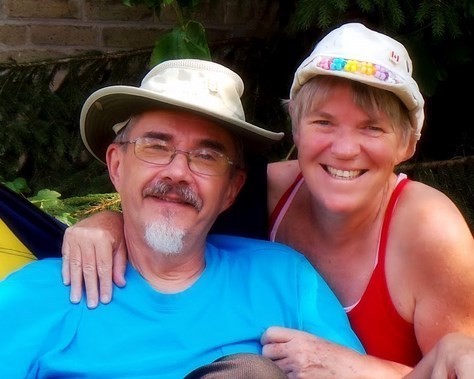 Happily on the road
Happily on the roadFreebie!!! A free gift for you. For a limited time, download free copies of any of my books.
Of course, you can pay for the pdf downloads, but I found a site that lets me charge "whatever you want to pay,” including FREE!
I hope you’ll like the idea and take advantage of it. But hurry, it won’t be around forever.
The details are on our publishing site, The Phoenix Centre Press. Have a look at the book descriptions, then click the link(s) in the blue box.
The post An Extra-special Freebie appeared first on The Pathless Path.
July 29, 2013
The walk of a thousand miles begins with the first step
The walk of a thousand miles begins with the first step — it’s about "just starting" — while dropping the excuses
In This Moment
The last post…
A reminder that we’re now also writing a travel blog called, "Simple Zen Travellers." We’ll share tools and methods for turning your travel into an adventure in self-knowing. You can sign up at:
http://www.simplezenguy.com/travellers/
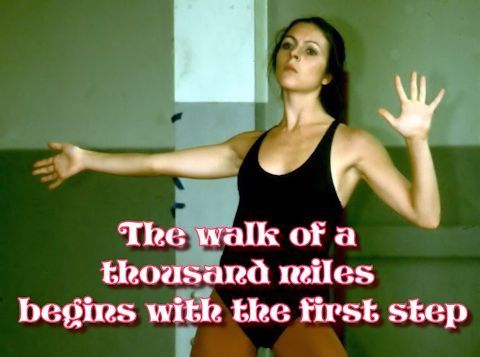
Funny where my mind goes. I guess most of you know that I was, for 13 years, a Presbyterian Minister. I jokingly say that, back in 1996, I “gave the Church up for Lent,” and never took it back.
Nevertheless, my back-history is Christian; I have since walked away from that circle and have focussed on Buddhism, mostly of the Zen strain. My brain still holds tons of "biblical references," which, like the stories of the Buddha, help us to see where we are stuck, and how we might unstick ourselves.
The major faith groups are remarkably alike in their overall teachings. All have a line similar to: "Do unto others as you would have others do unto you," for example. Also common is the idea that the walk of enlightenment is a journey that actually must begin.
Thus, today’s declaration:
the walk of a thousand miles begins with the first step.
Although this is the popular form of this quotation, a more correct translation from the original Chinese would be "The journey of a thousand miles begins beneath one’s feet." Rather than emphasizing the first step, Lau Tzu regarded action as something that arises naturally from stillness.
Another potential phrasing would be "Even the longest journey must begin where you stand." Or, "Thousand miles to be travelled, start with foot (placed) down."
[see http://en.wiktionary.org/wiki/a_journ...]
Like many Eastern constructions, this is a "Well, that’s obvious" statement. We might then wonder at the prevalence of this theme across cultures.
If it’s so simple, why keep repeating it?
I guess it’s not so simple.
So, where my mind went was to two "Jesus" stories that also share this theme. In both cases, Jesus is bopping along the road, and someone says or does something that interests him. In each case, he says, "Come and follow me."
In the one instance he is speaking to "the Rich Young Ruler," (Mt. 19:16-26) who had seemingly done some pretty profound stuff. He’d actually obeyed the law. He asked what else he needed to do.
Jesus said,
"If you want to be perfect, go and sell all you have and give the money to the poor, and you will have treasure in heaven. Then come, follow me." But when the young man heard this, he went sadly away because he had many possessions.
In the other instance, one of Jesus’ "2nd string followers" is invited to join the inner circle. Same pattern: Mt. 8:21-22:
Another of his disciples said to him, "Lord, first let me go and bury my father." But Jesus said to him, "Follow me, and let the dead bury their own dead."
Fitting these two stories together with our "thousand miles" quote tells us what is required, and how we resist.

Being on our Western road trip, I am thinking of the backpacking trips Dar and I have taken out here in Montana. Here’s a photo of Dar, back in the 80s, suitably "encumbered."
When you backpack, you are carrying your house and "stuff" with you. You have to think a bit. What are the essentials? What would be nice to have along? How much does all of this weigh?
The tendency for many of us is to try to drag everything along, "just in case."
Which is what is so nice about backpacking. Unless you plan on taking along a caravan of mules, you can only take what you can carry. And more: you can only take what you can carry all the way to wherever it is you are going, taking into consideration the terrain. I can carry more "on the flat" than I can carry in the high Rockies. That’s just the way it is.
The Rich Young Ruler story concerns possessions. It’s really an admonition about packing light.
The rich guy was looking for another "simple rule to follow." Jesus decided to cut to the chase. Rather than making it easy, he said, "Give up what is most important to you." In the rich guy’s case, it happened to be his possessions.
In another person’s case, the "giving up" might be giving up on certainty. Or giving up on being right. Or giving up on a relationship. Or giving up a job.
The same thing holds on a backpacking trip. I’ve seen people trying to take a mound of stuff into the back country. They have to learn to leave their excess baggage behind, so they can travel light.
Not easy when we have chosen to define ourselves by our possessions, or our knowledge, or our wisdom, or by job title, relationship, or letters after our name. Some of us define ourselves by "what ails us." (I can’t do this! I’m poor, or an "Adult Child", or a helpless victim, I’m lame, or the product of bad parenting!!!)
Yet, if we do not leave our "excuses" behind, we’ll never take the first step.
In the second story, Jesus again makes that remarkable offer, "Come and follow me." It’s an expression of, "Here is wisdom, and a path, (one of many, btw) and a guide, and a road map. But you have to do it now."
And the guy says, "Let me bury my father first."
Now, on the surface, this seems like a reasonable request.
Only thing is, the text doesn’t say that the guy’s father was actually dead.
For all we know, he was healthy as a horse.
Thus, the guy might have been simply stalling for time.
OK, I’m making a bit of a joke there, but I’m actually not. I had tons of clients, back in the day, that tell me that they couldn’t begin their own walk until:
their kids grow up (I kill myself over that one, as I know a lot of 30-year-old kids still clinging to mom and dad),
their parents die,
they make "enough money," or the best of all,
they’re waiting until the time is right.
Leave the dead to bury the dead. What an interesting line. It would almost seem to indicate that those not actively on the walk are the "living dead." Waiting, wailing, and moaning.
You see, the point here is that there is never going to be a perfect time to start. There is never going to be a time when you can haul all your crap with you. There is never going to be a time when everyone around you sings praises for your decision. There, in short, is never any time other than this moment. In this moment, there is one step. And one step. And one step.
I tend to burden myself with "what if’s." As I do, my walk almost slows to a standstill. I stall because the unknown-ness of the walk is scary. To simply leave, taking nothing along, not knowing where I am going, not knowing why, is scary. So I want to lie to myself and get the hell off the path. At least by the side of the road, frozen, I know where I am.
And then I see that just standing there, rooted to the spot, is the equivalent of dying. I’m going to have an eternity to practice being dead. There is only "now" to be alive. And to be alive is to walk. Despite the fear and without any certainty. Other than knowing that this is all there is. One moment and maybe the next. Waiting and wishing is not going to change things.
And so, we’ve sold most of what we own, put the rest in storage, and are "walking" with literally 2 backpacks and 2 computer cases. The walk of a thousand miles (and more) begins with stepping on the earth beneath our feet. It’s no different with the walk down enlightenment’s path.
What are you using as a way to stall? What are you attempting to drag along? Whose permission do you think you need? What do you think you need to "know before you go?"
Leave the dead to bury the dead. Travel light. Let go. And take a step.
Make Contact!
So, how does this week’s article sit with you? What questions do you have? Go to the top of the page, and click on the article title, and leave a comment or question!
Weekend Residentials
Darbella and I can help you to find a new, vibrant, rich path. Our Weekend Residential program is just you and us — we will work with you, helping you
to become the change you want to see.
Read about it here:
Weekend Residentials
The post The walk of a thousand miles begins with the first step appeared first on The Pathless Path.



